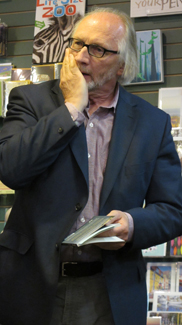Momentum Over Precision:
Katie Weaver in Conversation
with Patrick Friesen

Malahat volunteer Katie Weaver talks with Patrick Friesen about his translations of Ulrikka S. Gernes' Danish poetry, his stylistic approaches to form and technique, and the pros (and cons) of co-translating with friend and translator P. K. Brask. Friesen's four translations appear in At Home in Translation: Issue 188, Autumn 2014 of the Malahat.
Photo credit: Michael Elcock.
As I'm reading your translations of Ulrikka S. Gernes’ four poems in Issue 188 of the Malahat, I'm thinking about how often a directly-translated text doesn't make as much sense or doesn't read as nicely as it would in its own language. Did you end up taking any artistic liberties with the pieces? How much? Did you feel right or wrong in doing so?
A few days ago my wife mentioned that Amichai had said about translation that it was a bit like kissing one's bride through a veil. That suggests something fundamental about translation, that it is always an approximation of the first-hand experience. This is obvious; each language has its uniqueness, and some of the uniqueness can't be translated. I suppose the fundamental question a translator has to ask, and answer, is "do I want to do as literal a translation as possible, or do I want to make the writing in question work in my language as well as it worked in its original language?" We've all seen stiff, awkward translations where an attempt has been made to duplicate the original. I'm not interested in this kind of translation. The poem has to work in English.
I co-translate with my friend P. K. (Per) Brask. This is how we work; he does a literal translation from the Danish (his first language), making modifications of course as he does this (he's perfectly fluent in English as well), while I take what he's translated and try to make it work as well as possible in English. This is where my own craft and skills, as a poet, come into play. There are word choices, expressions, which simply don't work in English, or perhaps are somewhat archaic, so I try to find a close approximation which works in English. I have a working knowledge of associated languages like High German and Low German, and I have a Danish/English dictionary; so, to some extent, I can work backwards into the Danish version if I need to, when I have questions about some word choice, or word order, or phrasing. I gather my questions, and when I have finished looking at a manuscript, I call Per and we discuss these questions. On occasion, I've had these discussions with the poet being translated. Ulrikka S. Gernes, for example, has a good command of English. It's contemporary usage that may sometimes escape her. We discuss what she wrote, what was intended, and I tell her how it works, or doesn't, in English. And so it goes.
So, yes, I take some artistic liberties, but never without consultation with Per, and sometimes with the writer we're translating.
That sounds like a lot of pressure. Was it nerve-wracking trying to stay loyal and do justice to Ulrikka S. Gernes' pieces? Were there ever any points in the process that felt like the project was hopeless or doomed, or was it easy to stay true to her Danish words and make it work in English too?
No pressure. Not nerve-wracking at all. Just trying to do justice to the poems, knowing that, because the poet is alive, I can have her look over the finished manuscript. Sometimes, the poet will have a suggestion or two, or a question, and Per and I answer these as well as we can. On a few occasions I've had to convince the poet that, indeed, how she would translate a certain phrase, is archaic. Some poems are easier than others. I have worked on poems I didn't "get." Then a phone conversation with Per was necessary. We have great conversations (when I still lived in Winnipeg, we co-translated in the same room, at the same time) over poems, as to what works best. On at least one occasion Per and I never did agree on a particular word. I think I got my way that time, but I imagine he may still not be happy about that word.
What is it about translating poems that draws you in? You've had high praise for your original poetry, so why take a break from writing it to translating it?
Quite simply it began because Per Brask asked if I'd be interested in co-translating with him. I thought it a splendid idea and so it began. Since then, what draws me in is the exercise of finding that space that satisfies, as much as possible, the original intention of the poem, and also satisfies an English reader. It feels like an exercise where you know some words/phrases will never be quite right. No perfection. No exact parallel. That I find interesting. One is writing a new poem at the same time as transforming it from one language to another (an impossibility). As to my own writing, I always return to it with great care after I've worked at translation. I am more sensitive to turns of phrase, to precise word choice. This is very useful for me, as I tend to write poems with motion, with a flowing effect, and I find myself writing in overlapping phrases more than in single words. So, I turn back to the individual word. For a while. I'm not that kind of "care-ful" poet. But it does rein me in somewhat, and I find that useful, making me more attention to small details.
Has working with poems from another language changed the way you write? Do you still change the way you write at this stage in the game, after having published so much material?
Translating hasn't so much changed how I write as it has periodically focused me on the word more than on the phrase. I do change certain aspects of how I write occasionally, regularly. Primarily, these changes have to do with line lengths, questions of enjambment, and with punctuation lately. Line length has an effect on vocabulary for me. When I work with what I think of as a loping line I often tend toward a colloquialism, toward everyday conversational language. When I tighten the line, and I'm thinking of two to four words per line, there is a different focus and slightly different vocabulary (though, with a book coming out in the Spring of 2015, I have worked at utilizing the short line and remaining quite colloquial, conversational).
I think the reason is that the long line is based on the rhythms of a slightly heightened speech, while the short line does not allow that kind of rhythm to ever develop. And, what I discovered decades ago is that I think best with the rhythm of the long line, with the building momentum of overlapping phrases. That led me to the conclusion that it's how I naturally think, how I develop my thought process. It's cumulative with any given phrase emerging out of the previous phrase and heading into the next one, a kind of linking process. For me, this kind of thinking allows me to go almost anywhere. The frozen image, the fine word choice, or the perfect line, seem to be impediments to my thinking. Here's a possible comparison; my writing is probably closer to the way Neil Young plays guitar than the way Eric Clapton does. A "dirty" style rather than a "clear" style. Momentum rather than precision.
If somebody else was about to take on a project like this, what's the best piece of advice you could give that person?
I don't really have any advice for someone taking on a translation. I suppose I would simply say that it has to be true to the original and it has to work in English. But that's obviously true, almost a cliché. But that balancing act is the fun of it.
What has been your favourite, or most cherished part, of this process?
I've loved working with Per Brask, especially in the days we both lived in Winnipeg. We'd get together in my basement study and get at it, with lots of laughter. He'd translate quite literally, sitting there on the couch, and I'd type in what he said. He would sometimes refer to the dictionary, but mostly he could translate on his feet. As I typed what he gave me, I'd ask lots of questions. Does it work like this? How about this? What if I change that word? What if I reverse the word order? And on and on. That was always a great pleasure. Now, we work separately, but meet on the telephone to work out problems.

Katie Weaver
* * * * * * * *









